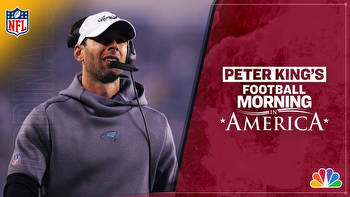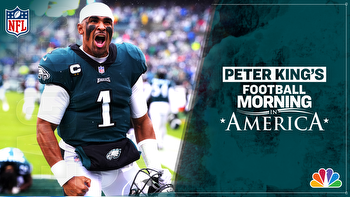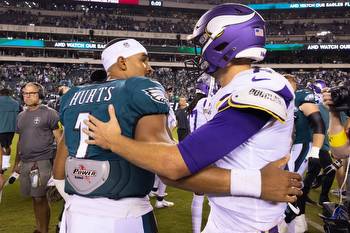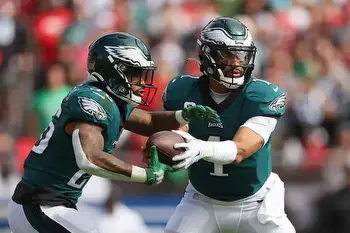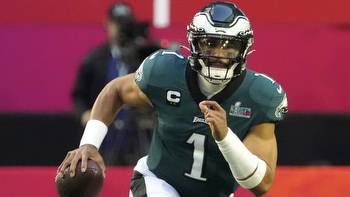How Eagles general manager Howie Roseman twice beat the odds
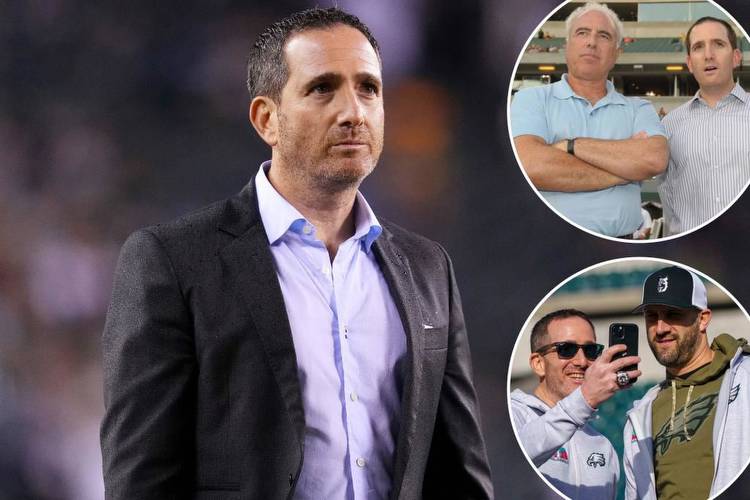
PHOENIX — The letters, all hand-written and delivered by the U.S Postal Service, kept coming, and coming.
From: Howie Roseman, a student at Fordham Law School.
To: Mike Tannenbaum, then the Jets’ pro-personnel director.
How often: “All the time,’’ Tannenbaum said.
How can I get into the NFL? Can you help point me in the right direction? I want to be a general manager. Can I come in and work for you?
Letters upon letters. Tannenbaum did his best to respond when he received inquiries such as these, trying to push forward the opportunities he once was given.
This was overwhelming, though. This guy Roseman sent me another letter?
“Yeah, he was relentless,’’ Tannenbaum told The Post. “It was far from the norm. It was clear he wasn’t going to take no for an answer.’’
Tannenbaum would answer with a suggestion and a polite rejection and Roseman would mail back a note of thanks for the rejection letter and the paper kept piling up.
“He did it in a way that I would say was more endearing than annoying,’’ Tannenbaum said. “I’m not sure exactly why or how, but it came across as, I took it as somebody that was smart and determined, more so than annoying.’’
Finally, Tannenbaum relented and brought Roseman in for an interview in 1999 for an internship role with the Jets. Roseman was one of three finalists, but he did not get the position. Tannenbaum was impressed enough to tell Joe Banner, the Eagles general manager, about Roseman, unaware that Roseman had also been inundating Banner with letters seeking advice and a job. Banner, in 2000, agreed to make Roseman a front office intern.
Roseman is still with the Eagles, enduring through good times and bad, rising and falling and rising again. It is rare when a high-level executive gets benched by his own franchise and is able to recover and prosper. At 47, Roseman has already constructed a team that won the first Super Bowl in Eagles’ history and on Sunday will try again to grab the brass ring — or, more precisely, a second sterling silver Lombardi Trophy — when the Eagles face the Chiefs in Super Bowl LVII. If the Eagles get it done, Roseman may get a statue of himself erected on Broad Street in Philadelphia.
“I don’t think there’s any validation,’’ Roseman said this week. “When you’re competitive and you’re in this business, you just kind of figure out where you are at the moment and you just keep trying to get better. The minute you feel that way, something happens and you get your ass kicked.’’
The 2022 Eagles are an incredible collection of talent. Roseman assembled the best offensive and defensive lines in the league, and in a finger-snap, he upgraded the receiver room by trading for A.J. Brown and drafting DeVonta Smith. He neatly regrouped after the Carson Wentz meltdown to locate a franchise quarterback, Jalen Hurts, in the second round of the 2020 NFL Draft. Roseman found Jordan Mailata, an Australian rugby player, and turned him into a starting left tackle. Roseman added to a potent defensive line by signing Haason Reddick, who produced 16 sacks this season. Roseman waited for the Giants to waive cornerback James Bradberry and barely a week later signed him. Roseman identified Nick Sirianni as an up-and-comer despite no previous head coaching experience at any level.
The roster has Roseman’s fingerprints all over it. All those letters sent to NFL executives all over the place, starting when he was 9 or 10 years old in Marlboro Township, N.J. — after his family moved out of Brooklyn — paid off. The youngster who told everyone he would one day be a general manager in the NFL is at the top of his profession.
“There was something that drove me since I was a little kid,’’ Roseman said. “I wanted to do this, I wanted to play at a high level, I couldn’t do that. I wrestled in high school at 119 pounds, so certainly I wasn’t going to play high-level football. I really just went in the direction of my dreams and I was fortunate that at that time you had a little advantage if you went in the direction of your dreams. And I was fortunate people took a chance on me. I certainly was persistent and determined about it and I think if you’re persistent and determined and you have a passion for something you have a chance.’’
He did it, and so, perhaps he looks for that persistence and relentless drive from others?
“Psychopaths?’’ Roseman said, smiling at this question from The Post. “I’m not looking for psychopaths.’’
Roseman rose through the ranks with the Eagles, establishing himself as a salary-cap strategist and contract negotiator. When Tom Heckert left for the Browns, Roseman was elevated into his dream job as the general manager.
Roseman turned an old roster into a young one and the Eagles went 10-6 and made the playoffs in 2010 with the head coach, Andy Reid, very much involved in personnel moves. The next year, the self-proclaimed “Dream Team’’ was born in Philly, as a spending spree brought in talent but produced a record of 8-8. Reid suffered the loss of his son to a drug overdose, the Eagles went 4-13 in 2012 and Roseman and owner Jeff Lurie brought in a college coach, Chip Kelly from Oregon, replacing Reid after 14 years.
Roseman oversaw a team that went 10-6 and made the playoffs in Kelly’s first season, but there was no sustainability. There were no playoffs in 2014, and Kelly then won a power struggle with Roseman and gained control of the roster.
Roseman was not fired, but he was moved to the other side of the building. He was essentially demoted and cast aside, stripped of any say in personnel decisions. It was then he realized “I’m not on scholarship’’ as his career cratered.
“Howie’s grown a lot as a young executive over time,’’ Lurie said. “He always had the talent and the ability to think outside the box, he was always strategic. He probably had to have his managing skills improved and I think when he had a chance to take some time off during that year and ever since then I think he’s had a much more sort of an introspective analysis of himself and it’s really helped him and helped us and it’s made him improve as a well-rounded executive.’’
Kelly flamed out and was fired with one game remaining in the 2015 season. Lurie brought Roseman back into a decision-making role and Doug Pederson was hired as the new head coach. Two years later, the Eagles won the Super Bowl for the first time. Roseman shot back at those who doubted him. He was not the most gracious winner, but that is his way.
“Sometimes in this league guys don’t get another chance,’’ Roseman said. “I owe so much to Jeffrey and his belief and his ability to kind of give me a chance to come back and work with people that I care about.’’
Tannenbaum went on to become the general manager of the Jets and later the executive vice president of the Dolphins. He now helps run The 33rd Team website, which calls itself a football think tank. He credits Banner for launching Roseman’s career because “he’s the guy that pulled the trigger to give Howie a meaningful opportunity in the NFL.’’ Tannenbaum does acknowledge “whatever small part I played’’ by reading all those letters and pointing Roseman in Banner’s direction.
“Obviously Howie’s done an incredible job and had a great career and I’m really happy for him,’’ Tannenbaum said. “I don’t think he really cares what other people think. I think he works hard and when it’s appropriate, he takes risks he thinks are appropriate and I don’t think he’s dogmatic in doing things, which a lot of people in our industry do and he deserves a lot of credit because of that.
“It’s a great team. I was really happy he basically got a second chance, people get second chances but it’s rare to get a second chance in the same building. Glad it worked out for him.’’













